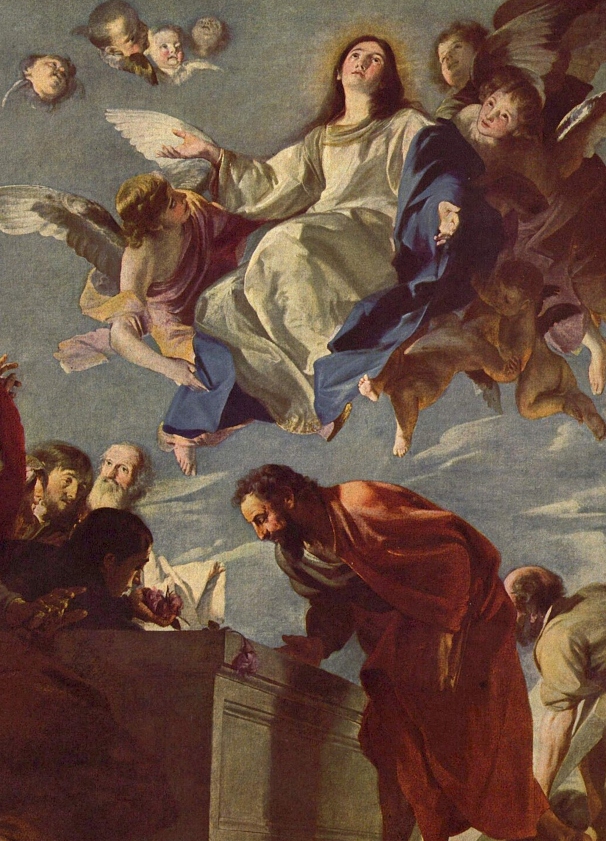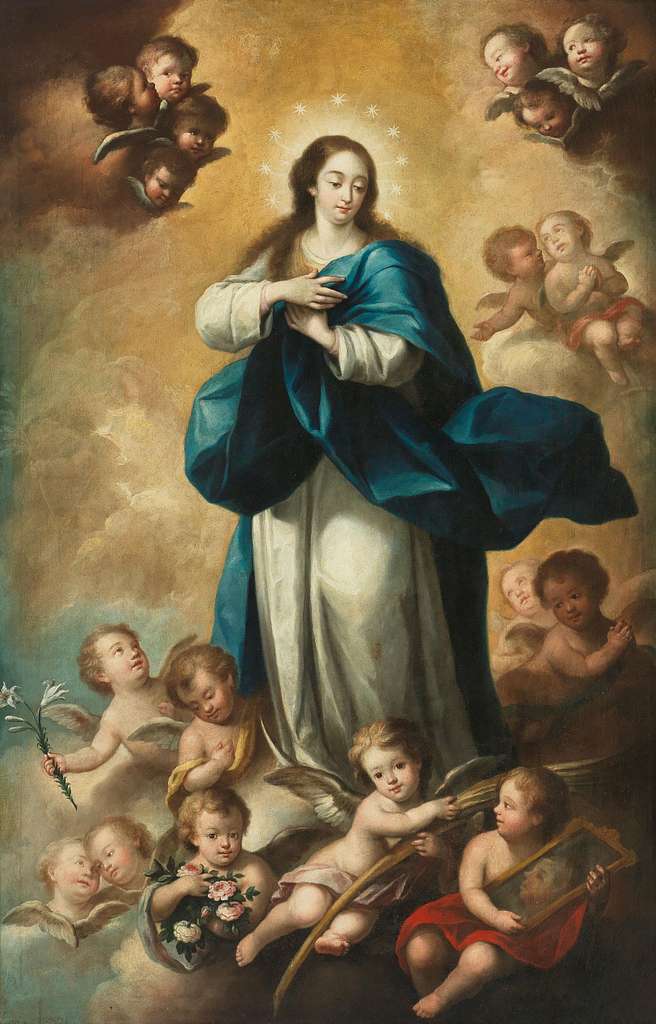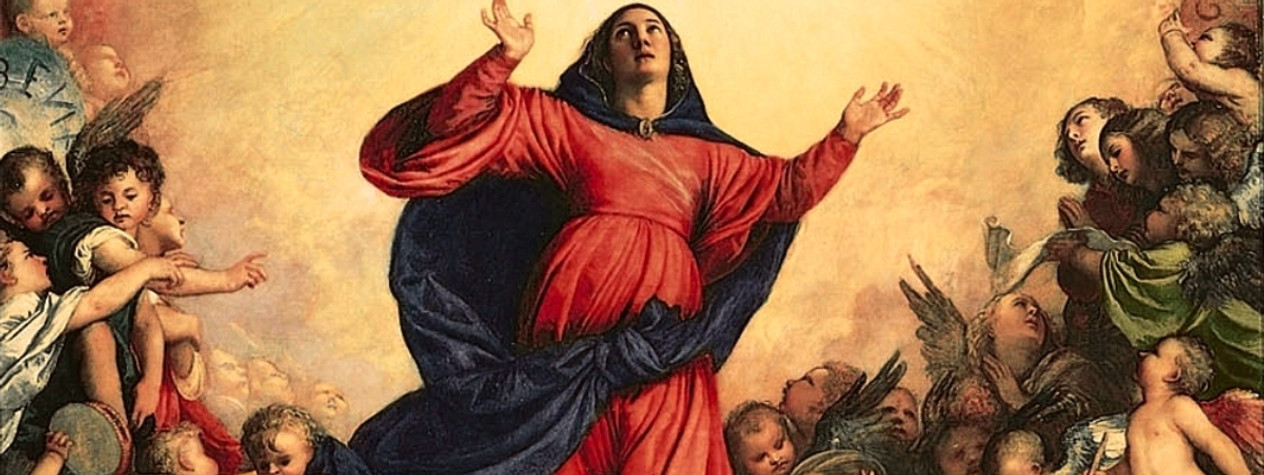The Meaning & Hope in the Assumption of Mary
Aug 15, 2024 by Cheryl Hadley
As we celebrate the Solemnity of the Assumption of Mary, the Church reminds us of her singular role and honors her as the Queen of Heaven, first among the saints. What should Catholics know about the Assumption of the Blessed Virgin Mary?
Two Special Privileges
God chose Our Lady for her role in our salvation, and so preserved her from the stain of original sin when she was conceived in the womb of her mother, St. Ann. Immaculate and free from all sin, Mary was truly "full of grace" when, as a young woman, she conceived Jesus through the Holy Spirit.
Because of her extraordinary role, she was likewise assumed, body and soul, into heaven at the end of her earthly life. The Church proclaims these two remarkable convictions as the Immaculate Conception and the Assumption.
These two privileges of Mary are closely bound to one another. Both reveal Our Lady's significance in our Faith and in salvation history. They are so important to our salvation that the Church has proclaimed them as dogmas - articles of faith we must believe as Catholics. In the United States, the feast days of both the Immaculate Conception (December 8th) and the Assumption (August 15th) are Holy Days of Obligation.
[[47313,16647]]

What do we believe?
The Assumption proclaims that “the Immaculate Mother of God, the ever Virgin Mary, having completed the course of her earthly life, was assumed body and soul into heavenly glory” (Pope Pius XII, Munificentissimus Deus, 44).
After her earthy life was ended, she did not ascend to heaven of her own power, as Jesus did. She was taken up by the power of God.
In fact, the word "assumption" comes from the Latin verb assumere, which means "to take to oneself." It is a fitting name for such a wonderful celebration.
Assumed into heaven, Mary gained a triumph over death that foreshadows our own triumph at the end of time. She now shares in the glory of her Son's Resurrection and anticipates the resurrection of all her children.
Not only that, but she experiences in heaven the union of a glorified body and soul. Our Lady is not a disembodied spirit. She is a complete human person, matter and spirit, reigning as our queen and Christ's partner in the work of salvation.
[[14719,31538]]
How old is our belief in the Assumption?
Though it's one of our oldest holy days, celebrated since the early 5th century, it wasn't until 1950 that Pope Pius XII wrote his apostolic constitution Munificentissimus Deus, declaring the Assumption of the Blessed Virgin Mary, body and soul, into heaven as “divinely revealed dogma,” infallible and beyond doubt.
Pope Pius XII's declaration did not originate the idea of the Assumption of Mary. It reiterated and formalized what the Church had already believed from her earliest days, and her liturgy had already celebrated for 1500 years.
[[38919]]
Where is Mary's death in the Bible?
Though we don't read about it in Sacred Scripture, Church Fathers and theologians believe the Virgin Mary died not as a result of original (or any human) sin, from which she was spared by God, but in accord with her Divine Son, Who also experienced death.
As Pope St. John Paul II explained,
Since Christ died, it would be difficult to maintain the contrary for his mother… the mother is not superior to the son who underwent death.” (General Audience, June 25, 1997).

How do we know it's true?
The early Church believed that Mary shared completely in Christ's glory as the Mother of Salvation and the Mother of us all. Through her motherhood, she was in constant union with her divine Son.
From the Incarnation to the Presentation to the Finding of the Child Jesus in the Temple; from His entire hidden life in her home to the first miracle at the Wedding Feast at Cana; from His public ministry to His Passion, Mary was there, sharing in her Son's salvific mission.
In the birth of the Church at Pentecost and the spread of the Church throughout the world, Our Lady was there, remaining in spiritual union with Christ, under the care of John and the other Apostles. She became their spiritual mother in the mission of building the Church and saving souls for her Son.
At every moment of great significance, and in the everyday moments in between, Mary's heart was entirely united to Christ's and she existed in conformity with Him.
[[55323,52634]]
Although the New Testament does not explicitly affirm Mary’s Assumption, it offers a basis for it because it strongly emphasized the Blessed Virgin’s perfect union with Jesus’ destiny. This union, which is manifested, from the time of the Savior’s miraculous conception, in the Mother’s participation in her Son’s mission and especially in her association with His redemptive sacrifice, cannot fail to require a continuation after death. Perfectly united with the life and saving work of Jesus, Mary shares His heavenly destiny in body and soul. – St. John Paul II
Then there is the physical reality of Mary's death. From the earliest days of the Faith, Christians venerated the bodies of the saints, taking them to secure and secret places like the catacombs, guarding and revering them.
As for Mary, there are no bodily relics. Yet, if a tomb were marked with her name and proclaimed her final resting place, especially in the early days of the Church, every Christian would know about it. Pilgrims would have flocked there in veneration and prayer, just to be near the Mother of the Messiah, to honor and petition her.
As Pope Pius XII explains, "the Church has never looked for the bodily relics of the Blessed Virgin, nor proposed them for veneration of the people." This is because the earliest Christians all believed Mary's body was assumed into heaven.
[[47962,56004]]

What does it mean for us?
While Mary's Assumption is a remarkable miracle, it is also representative of our own hopes for eternal glory. Not only do we hope to enter heaven as Our Lady did, but we believe in a physical resurrection where our own souls will one day be reunited to our glorified bodies.
Mary was granted this unique favor through the Assumption, so that the body of the one who was conceived without sin, became the first dwelling place for God, and remained a virgin despite childbirth, would never know decay.
Lord willing, the rest of us will receive our full triumph - and the full effect of Christ's victory over death - when our own souls are reunited with our glorified bodies at the end of time.
[[4781,49835]]
Mary became the new Eve, whose obedience helps repair our relationship with God the Father. She opened heaven for all of us, just as she opened the world to the presence of the Messiah through her "yes" to the Incarnation.
Through the superabundant grace of God, Mary continues to share in Christ's mission and purpose. She also possesses what belongs to her Son, so that her glorified presence as the Queen of Heaven shines brightly as a beacon of hope for us.
The thought of her empty tomb is a cause of great joy!
The Lord ascended to heaven in order to prepare our eternal home, knowing that the sweetness of home is, of course, the heart of a Mother.
In His generous love, He has ensured that she will be waiting for us, body and soul, when we finally arrive.
[[53654,43458]]





